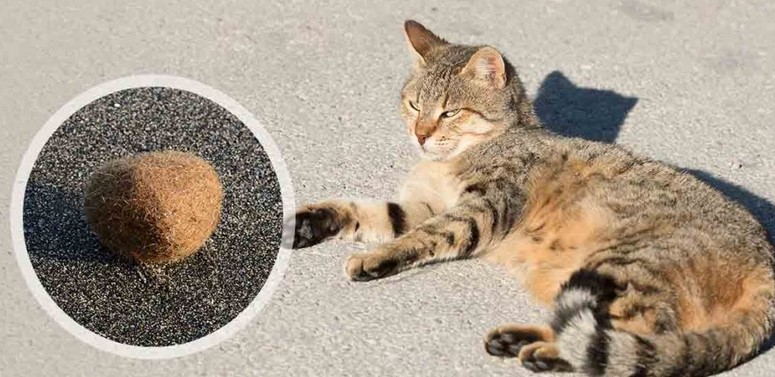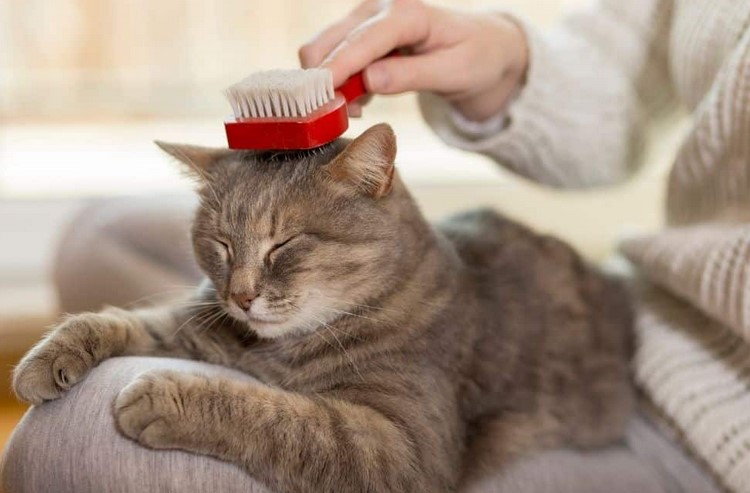While you can try rubbing Vaseline on your cat’s paws to help prevent hairballs, it’s a bad idea to use this long term as it can cause vitamin deficiencies. Another common ingredient in hairball solutions is plain mineral oil. Although this may help your cat’s hairballs, you should not breathe it in, as it can cause serious health problems. Make sure to brush your cat regularly and give him a hairball-specific food.
You might not enjoy scooping your cat’s litter box, but it is an important part of being at one with your cat. There’s a lot involved with keeping the litter box clean, as well as training your kitten or feline that it’s his duty to use the litter box. It takes time, and a consistent routine. Hairballs in cats are unpleasant. And they’re not just disagreeable for the person who has to clean them up — they can cause intestinal blockages, which can be a serious health problem for your cat. It’s given that cats are going to groom themselves, so what can you do to keep hairballs to a minimum?

How can you help prevent hairballs in cats?
Hairballs in cats are common and can cause a variety of problems for your feline friend. While cats do naturally groom themselves, hairballs can result from a blockage of the intestines. While some common symptoms of hairballs include a swollen belly, change in appetite, and hacking, you can take steps to reduce the chances of your cat developing these problems.
Firstly, you can offer your cat a treat that contains a hairball remedy. These are often flavored and will encourage licking. You can also offer your cat a new toy to play with or liven up their day. A veterinary checkup will not prevent hairballs but will allow your vet to diagnose any underlying health problems early. If you suspect that your cat is suffering from hairballs, a vet visit may be in order.
Aside from these home remedies, cat owners should also try grooming their cats daily. For cats with long hair, it’s also beneficial to take them to a professional groomer twice a year. You can also buy specific cat foods that contain special formulas that are designed to help prevent hairballs. These products are designed to strengthen the coat of your cat, minimizing shedding, and helping hair move through the digestive tract more smoothly. You should always consult with your veterinarian before administering any laxatives to your cat, because it may cause more harm than good.
Brush your cat
There are two main reasons why brushing your cat may help to prevent hairballs. First, cats love being petted, so brushing them can help them feel more relaxed and less stressed. It also helps prevent hairballs by keeping your cat’s coat clean. Cats also find it more pleasant to brush when it is rewarded with treats or playtime. If you want to prevent your cat from having hairballs, brushing is a must!
Second, frequent brushing is essential. Cats with long hair tend to have more hairballs than short-haired cats, so making regular brushing a habit can help prevent them from occurring. Another way to prevent hairballs is to play with your cat and give it toys instead of licking their coats. Lastly, give your cat lots of exercise. Exercise helps keep their digestive system functioning at its optimum level, which means less hairballs.
Schedule regular haircuts for your cat
It is common for indoor cats to have hairballs. While cats don’t actually cough up hairballs, they do swallow them. Eventually, these hairs will accumulate and form a
ball, which they then have to vomit. Hairballs can be fatal for a cat if they block its digestive tract. Scheduling regular haircuts for your cat can help prevent hairballs, and a good haircut can reduce the amount of hair that a cat swallows.
Grooming your cat regularly is vital for preventing hairballs. Regular grooming can involve twice a day, at least, during the months of May and June. A simple nylon comb from the drugstore is an effective tool for grooming. If your cat is particularly fussy, a cat comb from a pet store will work just as well. Nylon combs are inexpensive and have very few sharp teeth. They can also be wiped clean by dipping them into water.

Give your cat hairball-specific food
It is possible to help prevent your cat from suffering from hairballs by providing him with a specific food. Cats have rough papillae that help lift dirt from their fur. Hair in the intestines can cause blockage and result in vomiting. Cats can vomit more than twice a month. This is not normal and can lead to a serious health issue. A hairball can also cause vomiting and may even lead to an illness or death in severe cases.
If your cat consistently develops hairballs, it is important to identify the problem. An occasional hairball is not alarming, but a recurring problem may indicate a more serious health issue. A cat’s stomach should empty within 0.2 to 2 hours, and the hairball shouldn’t be clumped. If the hairballs persist, it’s an indication that your cat is suffering from a digestive problem.
Overall, you need to make sure that your cat has a proper diet – one low in carbohydrates and high in protein. This will help regulate the amount of hair that is gathered as it is passed through your cat’s digestive system. Feeding your cat wet food can also reduce the amount of hairballs that he produces – most cats will ingest this food without worrying about grooming themselves, so the excess fur is not collected throughout their bodies. If you can manage to talk with your vet about this problem, they may have other suggestions that can stop cats from creating and swallowing hairballs.

